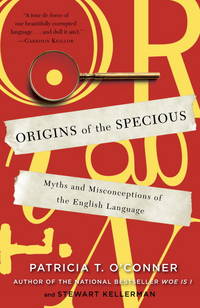
Origins of the Specious: Myths and Misconceptions of the English Language
by O'Conner, Patricia T.; Kellerman, Stewart
- Used
- very good
- Paperback
- Condition
- Very Good
- ISBN 10
- 0812978102
- ISBN 13
- 9780812978100
- Seller
-
Frankfort, Kentucky, United States
Payment Methods Accepted
About This Item
Synopsis
Do you cringe when a talking head pronounces "niche" as NITCH? Do you get bent out of shape when your teenager begins a sentence with "and," or says "octopuses" instead of "octopi"? Do you think British spellings are more "civilised" than the American versions? Would you bet the bank that "jeep" got its start as a military term and "SOS" as an acronym for "Save Our Ship"? If you answered yes to any of those questions, you're myth-informed. Go stand in the corner--and read this book!In Origins of the Specious, word mavens Patricia T. O'Conner and Stewart Kellerman explode the misconceptions that have led generations of language lovers astray. They reveal why some of grammar's best-known "rules" aren't--and never were--rules at all. They explain how Brits and Yanks wound up speaking the same language so differently, and why British English isn't necessarily purer. This playfully witty yet rigorously researched book sets the record straight about bogus word origins, politically correct fictions, phony francais, fake acronyms, and more. English is an endlessly entertaining, ever-changing language, and yesterday's blooper could be tomorrow's bon mot--or vice versa! Here are some shockers: "They" was once commonly used for both singular and plural, much the way "you" is today. And an eighteenth-century female grammarian, of all people, is largely responsible for the all-purpose "he." The authors take us wherever myths lurk, from the Queen's English to street slang, from Miss Grundy's admonitions to four-letter unmentionables. This eye-opening romp will be the toast of grammarphiles and the salvation of grammarphobes. Take our word for it.From the Hardcover edition.
Reviews
(Log in or Create an Account first!)
Details
- Bookseller
- Pink Casa Antiques
(US)
- Bookseller's Inventory #
- 77391
- Title
- Origins of the Specious: Myths and Misconceptions of the English Language
- Author
- O'Conner, Patricia T.; Kellerman, Stewart
- Format/Binding
- Paperback
- Book Condition
- Used - Very Good
- Quantity Available
- 1
- ISBN 10
- 0812978102
- ISBN 13
- 9780812978100
- Publisher
- Random House Trade Paperbacks
- Date Published
- 2010-08-24
- X weight
- 1 oz
